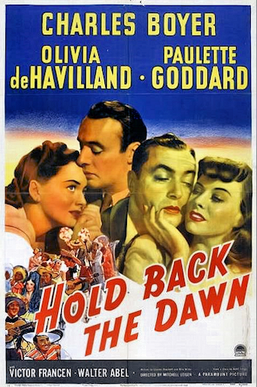
Hold Back the Dawn is a 1941 American romantic drama film directed by Mitchell Leisen, in which a Romanian gigolo marries an American woman in Mexico in order to gain entry to the United States, but winds up falling in love with her. It stars Charles Boyer, Olivia de Havilland, Paulette Goddard, Victor Francen, Walter Abel, Curt Bois, Rosemary DeCamp, and an uncredited Veronica Lake.

Susan Hayward was an American actress best known for her film portrayals of women that were based on true stories.

Smash-Up, the Story of a Woman, also called A Woman Destroyed, is a 1947 American drama film with elements of film noir that tells the story of a rising nightclub singer who marries another singer and becomes an alcoholic after sacrificing her career for him.

I Want to Live! is a 1958 American independent biographical film noir drama film directed by Robert Wise, and starring Susan Hayward, Simon Oakland, Virginia Vincent, and Theodore Bikel. It follows the life of Barbara Graham, a prostitute and habitual criminal, who is convicted of murder and faces capital punishment. The screenplay, written by Nelson Gidding and Don Mankiewicz, was adapted from personal letters written by Graham, in addition to newspaper articles written by Pulitzer Prize-winning journalist Ed Montgomery in the San Francisco Examiner. The film presents a highly fictionalized version of the case, indicating the possibility that Graham may have been innocent.

John Saxon was an American actor who worked on more than 200 film and television projects during a span of 60 years. He was known for his work in Westerns and horror films, often playing police officers and detectives.

The Roots of Heaven is a 1958 American adventure film made for 20th Century Fox, directed by John Huston and produced by Darryl F. Zanuck. The screenplay by Romain Gary and Patrick Leigh Fermor is based on Romain Gary's 1956 Prix Goncourt-winning novel of the same name. The film stars Errol Flynn, Juliette Gréco, Trevor Howard, Eddie Albert, Orson Welles, Paul Lukas, Herbert Lom and Grégoire Aslan. Huston later said that Roots of Heaven "could have been a very fine film. And largely owing to me was not a good film at all."

Ross Hunter was an American film and television producer and actor. He is best known for producing light comedies such as Pillow Talk (1959), and the glamorous melodramas Magnificent Obsession (1954), Imitation of Life (1959), and Back Street (1961).
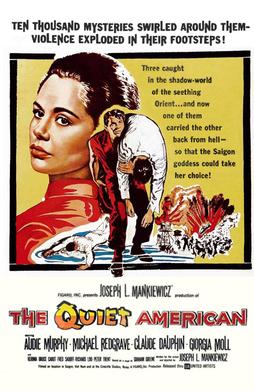
The Quiet American is a 1958 American drama romance thriller war film. It was the first film adaptation of Graham Greene's bestselling 1955 novel of the same name, and one of the first films to deal with the geo-politics of Indochina. It was written and directed by Joseph L. Mankiewicz, and stars Audie Murphy, Michael Redgrave, and Giorgia Moll. It was critically well-received, but was not considered a box-office success.

Back Street is a romance novel written by Fannie Hurst in 1931, with underlying themes of death and adultery. The book's copyright was renewed in 1958 for an original 1930 registration and a subsequent 1931 registration, meaning that different editions of the book were published. Each will become public domain in 2026 and 2027 for 1930 and 1931, respectively.
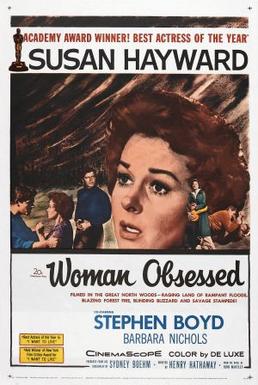
Woman Obsessed is a 1959 American romantic drama film directed by Henry Hathaway and starring Susan Hayward, Stephen Boyd, Barbara Nichols, Dennis Holmes, Theodore Bikel, Ken Scott, James Philbrook, and Florence MacMichael. The screenplay concerns the hardships faced by a widow and her eight-year-old son on a rugged Canadian ranch.
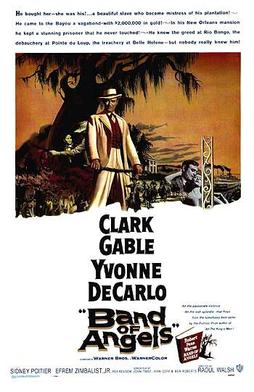
Band of Angels is a 1957 American psychological drama film set in the American South before and during the American Civil War, based on the 1955 novel of the same title by Robert Penn Warren. It starred Clark Gable, Yvonne De Carlo and Sidney Poitier. The movie was directed by Raoul Walsh.
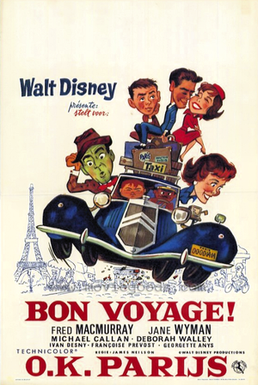
Bon Voyage! is a 1962 American comedy film directed by James Neilson and produced by Walt Disney Productions. It stars Fred MacMurray, Jane Wyman, Deborah Walley, Tommy Kirk, and Kevin Corcoran as the Willard family on a European holiday.

Sons and Lovers is a 1960 British period drama film directed by Jack Cardiff and adapted by Gavin Lambert and T. E. B. Clarke from the semi-autobiographical 1913 novel of the same name by D. H. Lawrence. It stars Trevor Howard, Dean Stockwell, Wendy Hiller, Mary Ure, and Heather Sears.

The Snows of Kilimanjaro is a 1952 American Technicolor romantic adventure film directed by Henry King from a screenplay by Casey Robinson, based on the 1936 short story of the same name by Ernest Hemingway. It stars Gregory Peck as Harry Street, Susan Hayward as Helen, and Ava Gardner as Cynthia Green. The film's ending does not mirror that of the short story.

The Velvet Touch is a 1948 American film noir drama directed by Jack Gage and starring Rosalind Russell, Leon Ames, Leo Genn and Claire Trevor.
Back Street or Backstreet may refer to:
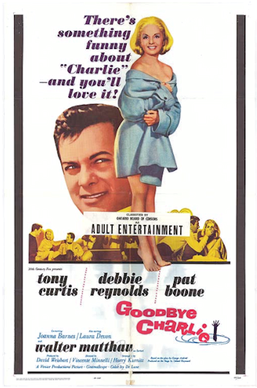
Goodbye Charlie is a 1964 American comedy film directed by Vincente Minnelli and starring Tony Curtis, Debbie Reynolds and Pat Boone. The CinemaScope film is about a callous womanizer who gets his just reward after a jealous husband kills him. It is adapted from George Axelrod's 1959 play Goodbye, Charlie. The play also provided the basis for the 1991 film Switch, with Ellen Barkin and Jimmy Smits.
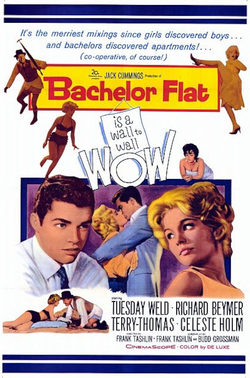
Bachelor Flat is a 1962 American DeLuxe Color comedy film directed by Frank Tashlin and starring Tuesday Weld, Richard Beymer, Terry-Thomas, and Celeste Holm. Filmed in CinemaScope in Malibu, California, the film is a revised version of Tashlin's own Susan Slept Here (1954).

The Shocking Miss Pilgrim is a 1947 American musical comedy film in Technicolor written and directed by George Seaton and starring Betty Grable and Dick Haymes.

The Marriage-Go-Round is a 1961 DeLuxe Color CinemaScope American comedy film directed by Walter Lang and written by Leslie Stevens. It is based on the 1958 play The Marriage-Go-Round, also penned by Stevens. The film stars Susan Hayward, James Mason, Julie Newmar, Robert Paige and June Clayworth. It was released on January 6, 1961, by 20th Century Fox.



















